 By now, many of you have probably heard us speak about commercial Property Assessed Clean Energy, or PACE, financing. It has become one of VAEEC’s top focuses in the past few years due to its ability to spur economic growth and revitalization while also reducing energy usage in commercial buildings. To learn more about the basics of PACE, visit our PACE webpage.
By now, many of you have probably heard us speak about commercial Property Assessed Clean Energy, or PACE, financing. It has become one of VAEEC’s top focuses in the past few years due to its ability to spur economic growth and revitalization while also reducing energy usage in commercial buildings. To learn more about the basics of PACE, visit our PACE webpage.
Recently, VAEEC held our second PACE webinar, C-PACE Financing in Virginia, back in September. Unlike our first PACE webinar, which mainly covered the basics of PACE, the main goal of this webinar was to be a resource for localities interested in developing and implementing a PACE program. The webinar provided listeners with:
- A brief overview of C-PACE, including its legality and case studies,
- Best practices when developing and implementing a program,
- The program administrator’s role,
- The benefits to localities, and
- The internal process of developing a PACE program.

PACE provides financing for energy efficiency renovations for commercial and multifamily buildings.
William Nusbaum (Williams Mullen) kicked things off with an overview of what PACE is and how it works in Virginia. He also touched on the Mid-Atlantic PACE Alliance, or MAPA, which is a partnership between Virginia, Maryland, and DC stakeholders created to accelerate PACE programs and project closings in the region.
Time and resources are by far the two most common concerns we hear from localities when talking about developing a PACE program. Scott Dicke (Sustainable Real Estate Solutions (SRS) and Arlington C-PACE) was able to address these concerns by discussing the role of the PACE program administrator. Program administrators alleviate the burdens placed on a locality when starting up and running a PACE program. They provide contractor education and support services to contractors, building owners, capital providers, and localities. Scott reinforced these points by providing case studies of programs SRS has helped launch and run.
Susan Elliott (City of Charlottesville) closed out the webinar with a local government perspective. Localities are interested in PACE because it is a tool that helps spur economic develop and revitalize existing building stock. Furthermore, Susan dove into the internal process of developing a PACE program and spoke about existing resources that help localities each step of the way.
Presentation slides and the audio recording can be accessed here. If you have any questions or if you would like additional information about PACE, please contact Jessica Greene.
A special thank you to Williams Mullen, our webinar sponsor, and our speakers.
By Kelley Flint
On May 19th, the VAEEC held their semi-annual member meeting, where speakers and attendees discuss this year’s pertinent theme—Opportunities in the Midst of Change. Over 100+ advocates from diverse backgrounds were in attendance, representing businesses, utilities, nonprofits, national associations, local governments and state agencies. While our current political climate is uncertain, VAEEC’s members and additional advocates made it clear they’re committed to continuing the push for energy efficiency and solutions that move Virginia forward.

The registration table featured the latest VAEEC report.
As an intern for VAEEC and first-time attendee, it was empowering to hear the discussions that took place from people with expertise and experience in this growing field. The presentations, questions posed and answers given were reassurance that even amidst all the unknowns in the environmental and energy sectors, there are people dedicated to making a tangible impact in my home state.
Here’s a brief recap of what was on the agenda.
-Executive Director Chelsea Harnish kicked things off with an introduction to the meeting’s topics and summary of the goals for VAEEC’s future. In addition to discussing the direction of the organization, she laid out five policy recommendations that are part of a newly-released report, “Why Energy Efficiency is a Smart Investment for Virginia”.
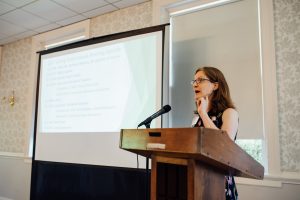
Executive Director Chelsea Harnish kicked off the spring meeting.
-Members then took turns sharing their success stories before splitting into groups for our first breakout sessions.
-In one room, Rich Dooley of Arlington County and Paul Brooks of Johnson Controls discussed Property Assessed Clean Energy (PACE) funding. The session focused on the development of PACE in Arlington, and how a local model can be used to fund energy efficient commercial buildings without taxpayer money. Paul Brooks also presented examples of PACE success in renovation projects and how PACE provides a financing solution to funding energy efficiency. The commercial PACE session was moderated by Abby Johnson from Atlantic PACE and Abacus Property Solutions.
-Meanwhile, the residential session took place next door and discussed the importance of Consistent Messaging. The speakers, Andy Farmer of Virginia Energy Sense and Casey Hollins of Rappahannock Electric Cooperative, emphasized outreach in communities and the variety of programs that can jump-start energy efficiency in the public. The residential consistent-messaging session was moderated by Jessica Greene from the Virginia Energy Efficiency Council.
-After lunch, the second round of breakout sessions included a presentation on New Commercial Technologies, led by Kristy Shoemaker of Trane and Greg Merritt of Cree Lighting. The presentation highlighted how rapidly evolving technology has created connections between devices, buildings and people that can be utilized to create more efficient energy use. Lighting technology was highlighted by Greg Merritt as an important advancement that reduces energy consumption by creating awareness of usage as well as reducing energy usage itself through technology changes. The commercial session on new technologies was moderated by John Morrill from Arlington County.

Panelists in the Sunroom discussed ways to address residential energy efficiency.
-At the same time as the commercial panel, Lauren Westmoreland of Southeast Energy Efficiency Alliance spoke about Building Codes. The session discussed how outdated codes prevent buildings from meeting efficient standards. Virginia is also in the middle of creating it’s 2015 building codes, and the juncture could be an opportunity to propel energy efficiency in Virginia. The residential session on building codes was moderated by Andrew Grigsby from the Local Energy Alliance Program.
-The final panel was led by Dan Bresette with the Alliance to Save Energy and Richard Caperton with Oracle. The panel discussed the Federal Implications for Energy Efficiency in Virginia and included an audience Q&A. The panel’s message highlighted that regardless of the direction the federal government takes, and the challenges budget cuts and policy changes may pose, Virginia has the opportunity to move forward with energy efficient solutions and pave the way for other states to follow. The final panel on federal implications in Virginia was moderated by Tom Nicholas from the City of Virginia Beach.
The full agenda can be found on the VAEEC website under Events. If you attended the event, please fill out this brief survey.
A special thanks to all of our event sponsors for making the Spring Meeting possible!
Venue Sponsor

Partners of VAEEC

Friends of VAEEC




Back in the summer of 2016, Governor McAuliffe signed Executive Order 57 (EO57), an initiative to reduce the Commonwealth’s carbon emissions. This Order established a workgroup to recommend concrete steps to reduce carbon emissions from Virginia’s electric power generation facilities, which account for roughly 30% of our total carbon emissions. Earlier this year, the workgroup was soliciting comments from the public on ways to cut Virginia’s carbon emissions from this sector.
The VAEEC supports EO57’s attempt to reduce the Commonwealth’s carbon emissions and has been actively engaged throughout this process. For example, Chelsea Harnish and Board member Andrew Grigsby gave a presentation to the workgroup at a meeting on building codes in January of this year. Currently, the VAEEC is focused on several program areas which reflect our role in advancing innovative and effective strategies in the energy efficiency field: supporting smart energy efficiency policies and programs through the Governor’s Executive Committee on Energy Efficiency, or GEC; Property Assessed Clean Energy financing, or PACE; and pushing for more rigorous energy codes in the Virginia Uniform Statewide Building Code, or USBC.
Thus, it made total sense for us to seize the opportunity to publicly comment on the importance of energy efficiency.
The VAEEC’s comments were carefully crafted to encourage the EO57 workgroup to include energy efficiency as part of the Commonwealth’s compliance plan to reduce carbon pollutions from the electric sector. After all, energy efficiency is one of the most practical, cost-effective tools to reduce our energy consumption and dependency on fossil fuels, which in turn, helps mitigate climate change. Furthermore, energy efficiency is a $1.5B industry in Virginia that supports more than 75,000 jobs. Therefore, we recommended that the EO57 workgroup include energy efficiency as a viable option for reducing carbon pollution from power plants.
Additionally, our comments encouraged the EO57 workgroup, and all Secretariats and state agencies represented by members of the workgroup, to become more actively engaged in the utility proceedings before the State Corporation Commission. These proceedings provide an opportunity to interject different perspectives into these conversations including from those who are charged with protecting consumers from paying higher-than necessary energy bills and agencies tracking our air quality and/or progress toward meeting Virginia’s voluntary energy reduction goal.
Energy efficiency is a practical, cost-effective tool that reduces energy consumption and carbon pollution, saves money on utility bills, creates jobs, and positively contributes to Virginia’s economy. The VAEEC will continue to work hard to advance energy efficiency across the Commonwealth, and we hope that the EO57 workgroup will recognize the value and opportunities energy efficiency offers.
VAEEC’s full comments submitted to the Executive Order 57 workgroup can be found here.
The Richmond Times-Dispatch just ran a story, “Will Virginia forge its own path on carbon regulation,” about the EO57 process which you can read here.
 Property Assessed Clean Energy financing, or PACE, is starting to get more and more attention around the Commonwealth and the nation. In fact, Governor McAuliffe and his administration recognized PACE as a viable means to create more jobs, save energy, and lower electricity bills in a recent press release. As it’s popularity increases, many are still unaware of just exactly what PACE is and who it can benefit.
Property Assessed Clean Energy financing, or PACE, is starting to get more and more attention around the Commonwealth and the nation. In fact, Governor McAuliffe and his administration recognized PACE as a viable means to create more jobs, save energy, and lower electricity bills in a recent press release. As it’s popularity increases, many are still unaware of just exactly what PACE is and who it can benefit.
PACE financing is a loan program to help bring low-cost, long-term capital to fund the rehabilitation of existing and new privately owned commercial buildings through energy efficiency, renewable energy, and water conservation projects. The loan is repaid annually through the property’s real estate tax bill.
Thirty-three states and Washington, D.C. have passed legislation at the state level to enable PACE financing; nineteen of those states have already started a PACE program. In Virginia, a commercial PACE, or C-PACE, enabling law was originally enacted in 2009 and amended in 2015. Virginia’s PACE law requires a locality to develop a PACE program, and private lenders make the loan and negotiate directly with the property owner on rates and terms. Currently, Arlington County is the only Virginia jurisdiction actively developing a PACE program; however, several over localities are exploring the development of their own programs.
Practically all privately-owned commercial buildings, regardless of size, are eligible for PACE financing, including office, retail, hotel, and industrial space. Eligible PACE projects must either reduce energy consumption or generate energy, and they must be permanently affixed to the property. Eligible improvements include: insulation, solar panels, lighting, roofing, and HVAC systems. In Virginia, commercial, nonprofit, and multifamily buildings (except condos and dwellings with less than five units) are eligible regardless of their age.
PACE offers an array of benefits for each key stakeholder: property owner, contractor, lender, locality.
Property owners:
– 100% financing: PACE covers 100% of all hard and soft project costs, eliminating the need for upfront cash investment.
– Long-term loan: With terms up to 20+ years, PACE loans result in lower annual payments and immediate positive cash flow.
– Transferable: PACE loans do not have to be paid off at the time of sale; they transfer to the new owner.
– Non-accelerating loan
Contractors:
– Increase sales volume and improve profit margin: By covering 100% of project costs and eliminating the requirement for out-of-pocket expense, PACE brings financing to more customers. Since PACE is based on equity in the property and not personal credit, it is easier for more customers to obtain financing.
– Fund deeper energy retrofits: Long-term financing enables customers to take advantage of projects with longer paybacks, which leads to more comprehensive projects with greater effect on energy usage. PACE can also fund efficiency improvements that are not allowable uses of Weatherization Assistance Program funds (i.e. replacement windows).
– Gain support and resources: PACE programs can be developed to offer an array of contractor services to help grow business and streamline financing. Services include training, call center support, customizable marketing materials, tools to pre-qualify customers, project estimation calculators, and web portals for financial analysis and deal-tracking.
– Spur demand for retrofits and energy auditors: As the number of people taking advantage of PACE increases, PACE could spur a surge of private demand for well-trained retrofitters. Additionally, as the program grows, so will the demand for energy audits. Energy audits are used to track a building’s energy usage before and after PACE improvements are installed.
Lenders:
– Meet client’s needs of implementing upgrades
– Increase value of collateral: upgrades and improvements increases the value of the property
– Enhances property owner’s ability to pay their debt: raises net operating income (NOI) through low annual payments and decreased operating costs
Localities:
– Creates employment opportunities for contractors, trades, engineers, vendors, etc.
– Serves as a redevelopment tool for “tired” buildings with obsolescent and inefficient systems
– Improvements make buildings more marketable, leading to better tenant retention and increases property values
– Increased property taxes and construction fees yields more revenues for jurisdictions
– Reduces locality’s carbon footprint, enabling it to become a green leader
– Minimal municipal burden: a third party administrator carries the cost of starting and running the program
The difference between traditional bank financing and PACE financing:
| Traditional Bank Financing |
PACE Financing |
| Purpose: HVAC and Lighting |
Purpose: HVAC and Lighting |
| Project Cost: $100,000 |
Project Cost: $100,000 |
| Loan: $75,000
25% upfront cash investment required |
Loan: $100,000
$0 upfront cash investment required |
| Interest Rate: 5% |
Interest Rate: 6.25% |
| Term: 5 years, fully amortizing |
Term: 15 years, fully amortizing |
| Monthly Payment: $1,415 |
Monthly Payment: $857 |
| Annual Payment: $16,984 |
Annual Payment: $10,290 |
PACE financing is a lucrative tool that can benefit all parties involved. We look forward to seeing Arlington get their program up and running later this year and are excited to continue working with other localities as they explore the feasibility of developing their own PACE programs.
If you would like additional information about PACE, please contact VAEEC Program Coordinator Jessica Greene.
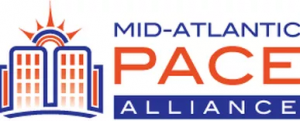 Last week (February 20, 2017) VAEEC participated in the first Mid-Atlantic PACE Alliance (MAPA) kick-off meeting in northern Virginia. MAPA is the result of a U.S. Department of Energy grant to support the development, implementation, and utilization of Commercial Property Assessed Clean Energy (C-PACE) programs throughout Virginia, Maryland, and Washington, D.C. The Virginia Department of Mines, Minerals and Energy is leading this effort between private and public stakeholders to develop and promote best practices, which will make the development of PACE programs more effective and will accelerate the growth of C-PACE programs throughout the region.
Last week (February 20, 2017) VAEEC participated in the first Mid-Atlantic PACE Alliance (MAPA) kick-off meeting in northern Virginia. MAPA is the result of a U.S. Department of Energy grant to support the development, implementation, and utilization of Commercial Property Assessed Clean Energy (C-PACE) programs throughout Virginia, Maryland, and Washington, D.C. The Virginia Department of Mines, Minerals and Energy is leading this effort between private and public stakeholders to develop and promote best practices, which will make the development of PACE programs more effective and will accelerate the growth of C-PACE programs throughout the region.
Educating stakeholders and standardizing templates and models are two key focuses of the MAPA team. Partners will use grant money to educate primary stakeholders (localities, property owners, lenders and borrowers, and contractors) about PACE. The second focus is to develop streamlined, consistent practices that will propel the adoption of PACE across Virginia while supporting the expansion of existing programs in Maryland and Washington, D.C. This includes the creation of consistent, cost-effective practices for program administration, drafting ordinances, financial underwriting guidelines, measurement and verification requirements, contractor training, and overall support.
This grant will enhance the work the VAEEC is already doing to further promote and advance PACE throughout the Commonwealth.
Click here to learn more about MAPA and here to read a copy of Governor McAuliffe’s press release about the grant.
Lowell Ungar, Senior Policy Advisor with the American Council for an Energy-Efficient Economy, wrote the following blog post on what the future of energy efficiency looks like under the Trump administration.
Barely one week into the new administration, we are far enough into the water to see dim shapes of the future ahead—some look more like sharks, some like rocks. Here’s some of what we see as of now:
Department of Energy programs face an undertow. In his confirmation hearing Secretary-designee Rick Perry was surprisingly supportive of DOE’s research and the national labs (for someone who once called to axe the entire agency). But President Donald Trump ordered a broad hiring freeze as a first step toward reducing the federal workforce. There is also reportedly a proposal to eliminate the whole Energy Efficiency and Renewable Energy Office (among others) in a broad budget outline that may be released in February. We are gearing up to support the efficiency programs when Congress takes up funding bills for the rest of 2017 in April and for 2018 later this year.
Appliance standards may be treading water for now. Although three recent standards could be subject to repeal under the Congressional Review Act, they do not appear to be prime targets, based on several meetings with congressional staff. On the other hand, five standards that were finalized but not officially published (as well as a manufactured housing standard that was under final review) may be caught in a temporary moratorium on regulations issued by Trump’s chief of staff Reince Priebus.
Vehicle standards face submerged reefs. The standard for trucks and buses also could be subject to congressional repeal, but it does not appear to be at the top of the target lists. On the other hand, Trump suggested he will ease regulations on car companies, which could include the fuel economy and tailpipe emissions standards for cars and light trucks. In any case, California will very likely maintain its emission standards, which apply in 12 other states as well.
Clean Power Plan may be dead in the water. The new White House website says Trump is “committed to eliminating…the Climate Action Plan,” and Environmental Protection Agency Administrator-designee Scott Pruitt said he continues to oppose the Clean Power Plan rules on carbon emissions from existing power plants. The next step may depend on an imminent ruling from the DC Court of Appeals. But regardless of the fate of this rule, the critical issues of clean air and public health will remain.
Tax reform and infrastructure are about to dive in. Trump continues to talk about infrastructure investment and cutting taxes as ways to spur economic growth. Congress is interested in tax reform but concerned about increased spending. These issues may be paired, starting with a 2018 budget resolution in late spring but extending into the fall. We have joined with other efficiency supporters to send up proposals for tax reforms and investments that increase efficiency. Still on shore is a farm bill that could foster efficiency in rural areas.
Regulatory reform is making waves. Trump signed an executive order directing that for every new rule, two be repealed, and limiting the combined cost (no mention of benefits) of the new and repealed rules, unless prohibited by law. He also has continued his statements against regulations, including a perhaps hyperbolic intent to “cut regulations by 75%, maybe more.” The House has already passed a few bills to make it more difficult to issue new rules or easier to repeal recent ones, but they do not appear to have the 60 Senate votes needed to overcome a filibuster. We and other efficiency supporters sent a letter cautioning Congress not to lose the benefits of appliance standards.
Federal efficiency policy may indeed be in troubled water, but we will seek to keep vital policies and programs afloat while also working at the state and local levels, which are partly sheltered. Following the example of our founders like Art Rosenfeld, our focus will remain on empirical research and analysis, which we trust will show that energy efficiency remains a crucial support for economic development, job creation, and consumer benefits.
The Virginia Energy Efficiency Council is diligently working to build a coalition of support for Property Assessed Clean Energy financing, or PACE, and to provide guidance and resources to localities interested in developing PACE programs. To assist with this effort, VAEEC has initiated a series of events across the Commonwealth suitably called “PACE Lunch + Learns”. Each event is open to anyone interested in learning more about PACE; however, these events target commercial property owners, contractors, lenders, and local government officials. Knowledgeable speakers from the field will provide attendees with information on PACE and answer PACE-related questions. VAEEC is teaming up with different sponsors to host the events and provide a complimentary lunch to all in attendance.
On Monday, December 5, VAEEC and Williams Mullen kicked off the first Lunch + Learn for the Hampton Roads/Norfolk area with a diverse group of nearly 30 people in attendance. Speakers included Abby Johnson, Bill Nusbaum, and Rich Dooley. Abby Johnson is the President and founder of Abacus Property Solutions, an independent real estate advisory firm. Abacus provides PACE project development and consulting and works with capital partners to identify PACE opportunities and develop PACE programs. Bill Nusbaum is an attorney with Williams Mullen, a full-service law firm, which is a key stakeholder in developing PACE financial underwriting guidelines with the Department of Mines, Minerals and Energy along with Abacus and VAEEC. Rich Dooley is the Community Energy Coordinator with Arlington Initiative to Rethink Energy (AIRE) in Arlington County. AIRE’s goal is to cut greenhouse gas emissions from County operations. Arlington County is the first locality in the Commonwealth on track to develop a PACE program.
The presentation provided a wealth of knowledge for all in attendance as it covered many different aspects of PACE. Here are my key take-aways:
- PACE provides a win-win opportunity for property owners, contractors, localities, and lenders. Through PACE financing, commercial and multifamily property owners can receive 100% project funding for energy efficiency, renewable energy, and water conservation upgrades. The loan is paid back as a line item on the property tax bill, and in most cases, the utility savings from the funded projects cover the costs of the loan. Additionally, as a senior lien status, PACE assessments stay with the property upon sale.
- Contractors benefit from PACE through increased sales volume and improved profit margin. By helping customers reduce costs and improve the value of their property, customers are able to spend more on additional building improvements.
- PACE spurs economic development within localities. Not only does PACE provides jobs, it improves building stock and increases property values, which produces more revenue for the jurisdiction. PACE serves as a redevelopment tool for older buildings at little to no cost to the locality; third party providers carry the cost of starting and maintaining the program. Furthermore, PACE helps decrease a locality’s carbon footprint.
- Based on the types of questions posed by the audience, the advantages of PACE to lenders is perhaps the hardest to grasp. In order for a PACE program to be full-fledged and offer the most benefits to all parties involved, the existing mortgage holder must consent to allow PACE to take senior lien status. However, PACE is still beneficial to lenders because it increases the value of their collateral. Moreover, PACE improves a property’s net operating income (through reduced utility bills), and the project is cash flow positive (the loan payment is typically less than the energy savings). In fact, over 200 lenders nationwide have already consented to make their mortgage junior lien status because they recognize these benefits.
- Arlington County is on track to become the first locality within the state to develop a PACE program. Other localities, such as Norfolk, the City of Fairfax, and Richmond have expressed interest in developing PACE programs.
- To facilitate interest in and garner support for PACE, Arlington engaged with the real estate community and coordinated with the private sector and several County departments. By building a relationship with these groups, there was enough interest in PACE to begin developing a program. Currently, Arlington is in the midst of finalizing a Program Administrator. The program is on track to launch in early 2017.
Our next PACE Lunch + Learn is scheduled for Tuesday, January 31 in Ashland. Stay tuned for a Lunch + Learn event in your area.
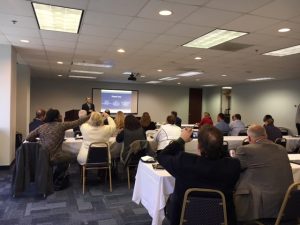
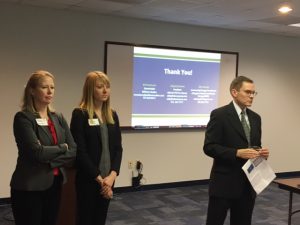
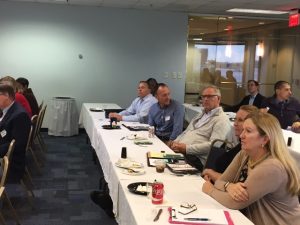
 By now, many of you have probably heard us speak about commercial Property Assessed Clean Energy, or PACE, financing. It has become one of VAEEC’s top focuses in the past few years due to its ability to spur economic growth and revitalization while also reducing energy usage in commercial buildings. To learn more about the basics of PACE, visit our PACE webpage.
By now, many of you have probably heard us speak about commercial Property Assessed Clean Energy, or PACE, financing. It has become one of VAEEC’s top focuses in the past few years due to its ability to spur economic growth and revitalization while also reducing energy usage in commercial buildings. To learn more about the basics of PACE, visit our PACE webpage.











 Property Assessed Clean Energy financing, or PACE, is starting to get more and more attention around the Commonwealth and the nation. In fact, Governor McAuliffe and his administration recognized PACE as a viable means to create more jobs, save energy, and lower electricity bills in a recent
Property Assessed Clean Energy financing, or PACE, is starting to get more and more attention around the Commonwealth and the nation. In fact, Governor McAuliffe and his administration recognized PACE as a viable means to create more jobs, save energy, and lower electricity bills in a recent  Last week (February 20, 2017) VAEEC participated in the first Mid-Atlantic PACE Alliance (MAPA) kick-off meeting in northern Virginia. MAPA is the result of a U.S. Department of Energy grant to support the development, implementation, and utilization of Commercial Property Assessed Clean Energy (C-PACE) programs throughout Virginia, Maryland, and Washington, D.C. The Virginia Department of Mines, Minerals and Energy is leading this effort between private and public stakeholders to develop and promote best practices, which will make the development of PACE programs more effective and will accelerate the growth of C-PACE programs throughout the region.
Last week (February 20, 2017) VAEEC participated in the first Mid-Atlantic PACE Alliance (MAPA) kick-off meeting in northern Virginia. MAPA is the result of a U.S. Department of Energy grant to support the development, implementation, and utilization of Commercial Property Assessed Clean Energy (C-PACE) programs throughout Virginia, Maryland, and Washington, D.C. The Virginia Department of Mines, Minerals and Energy is leading this effort between private and public stakeholders to develop and promote best practices, which will make the development of PACE programs more effective and will accelerate the growth of C-PACE programs throughout the region. 

